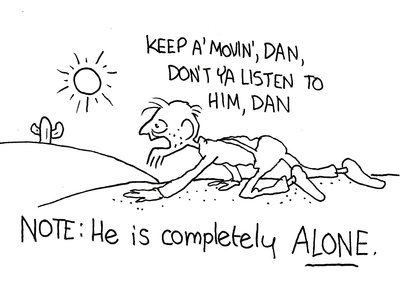« older | Main Largehearted Boy Page | newer »
January 29, 2018
Book Notes - Man Martin "The Lemon Jell-O Syndrome"
In the Book Notes series, authors create and discuss a music playlist that relates in some way to their recently published book.
Previous contributors include Bret Easton Ellis, Kate Christensen, Lauren Groff, T.C. Boyle, Dana Spiotta, Amy Bloom, Aimee Bender, Jesmyn Ward, Heidi Julavits, Hari Kunzru, and many others.
Man Martin's hilarious novel The Lemon Jell-O Syndrome is filled with clever wordplay.
Kirkus wrote of the book:
"A ...charming, gravely loopy bit of whimsy equally likely to appeal to amateur etymologists, untenured academics, spouses who fear cuckolding, and anyone who’s ever woken up with the feeling that they aren’t quite themselves."
In his own words, here is Man Martin's Book Notes music playlist for his novel The Lemon Jell-O Syndrome:
Like my protagonist, Bone King, I'm a southerner, and, also like him, an aficionado of country music, to which almost all the songs in this playlist belong. Don't judge. It was imprinted on me from birth, like a baby duckling meeting its mother. Country songs are like country folks: sentimental, naive, prone to corny puns, but at their best, good-hearted, sincere, and worth having around in hard times. I'm a humorist, yet only one of these songs is funny. Go figure. The book designer for The Lemon Jell-O Syndrome, Kathleen Lynch, graciously allowed me to provide marginal drawings for the novel, so I have accompanied a few of these commentaries with illustrations as well.
"Blue Skies" by Willie Nelson
Al Jolson performed this in The Jazz Singer, making it one of the first songs recorded in a talkie. The insipidly cheerful lyrics, "Blue skies, smilin' at me, nothing but blue skies do I see," belie a melody the speaks of undefined loss. At times, Willie sounds hoarse with unshed tears, but then again, maybe Willie always sounds that way; nonetheless, the mandolin is unmistakably doleful, and the harmonica is downright mournful.
Maybe Irving Berlin, who often recycled his own music, put lyrics from one song into the melody meant for another, but in any case, the paradox - happy things that bring on sadness and sad things that us give us secret joy - is one of the early warning signs you've got the Lemon Jell-O Syndrome.
"High and Low" by the Dirt Daubers
Bone's syndrome manifests as an intermittent inability to go through doors. His neurologist, Dr. Limongello, suggests that when this happens, he dance through, following the same logic that when singing, stutterers communicate without impediment. Unluckily for Bone's tender pride, he's from Appalachia, so the only dance he knows is the square dance. The maniac banjo and clackety percussion of this song remind me of a toy Bone would have grown up with, a "limber-jack," consisting of a wooden man with articulated joints and a stick coming out of his back. When you rest the man's feet on a paddle and thump it, he does a lunatic jig like a clogger with St Vitus, exactly the kind of dance Bone requires to get through doors. I imagine the song's opening strains running through his head each time he commences his dos-e-do. If The Red Shoes were about square-dancing, this would be the soundtrack.

"I Really Don't Want to Know," by Eddy Arnold
In the "Crying, Loving, and Leaving" subgenres of country music, this falls in the sub-sub-genre of "Doubting," in which, as in The Lemon Jell-O Syndrome, the torment of uncertainty proves worse than the pain of knowing.
Eddy Arnold, NOT to be confused with television actor Eddie Albert, maintains he doesn't want to know how many lovers his sweetheart has had, but keeps returning to the question, like a tongue seeking out the gap left by a missing tooth, "No wonder, no wonder, I wonder, though I really don't want to know." In the best 1960's country music style, a restrained steel guitar is sweetened with a string section and a piano that sometimes sounds like it's playing chopsticks.
Hokey, yes, as all great country music is, but only Eddy Arnold could make hokeyness so tuneful and lovely. This is the equal and opposite force to "Blue Skies," an ostensibly sad song that makes you feel good. Bone loves feeling sorry for himself - and really, who doesn't? - getting down and rolling in it like a dog on a lawn. If you're in a mood to savor your own unhappiness, you could do worse than listen to Eddy Arnold.

"Flowers on the Wall," by the Statler Brothers
A song about breaking down after breaking up, which is what Bone does when his wife leaves him for the yardman. The only comic song in the bunch, but if you ignore the plucky instrumentation, there's no mistaking the plaintiveness of the harmonies. During the chorus, "smoking cigarettes and watching Captain Kangaroo," the pedal-drum is working like a tom-tom, and Harold Reid - only two of the quartet were brothers and none were named Statler - hits a bass note on the "kang" of "kangaroo," like a bullfrog rippling a pond of shimmery tenors.

"Cool Water," by Johnny Cash
At one point, Bone nearly dies of thirst in his own home - you'll have to read the book to learn how - and the butter begins slipping off his noodles. As I wrote, I tried channeling this song's desperation and sense of unreality. A prospector, lost in the desert, urges, "Keep a-movin', Dan, don't you listen to him, Dan, he's a devil, not a man, and he spreads the burning sand with water." He's still sane enough to know a mirage when he sees one, but I'm pretty sure "Dan" is either his mule, an imaginary companion, or a fellow-prospector whose desiccated corpse lies some miles back. There's a million other versions, but Johnny's gritty, trembling baritone, and plain-spoken phrasing make this my favorite.

"Hallelujah" by the Good Lovelies
It's probably time for a moratorium on covering this Leonard Cohen song, but I'm a sucker for harmonies, and The Good Lovelies deserve their name. I've listened and listened to this mysterious piece, trying to get its essence, sensing something I'm working through myself, though from a different direction. At first, I thought it was a religious song, then that it wasn't, then finally, that it definitely is. I think it expresses a shocking faith that as terrible and heart-wrenching as it is, as badly as we manage it, as much harm as we do with it, and with none of its hurt and loss and disappointment diminished, we will one day stand before the Lord of Song, gratefully singing "hallelujah," for love.
"Big Bad Handsome Man" by Imelda May
I like pretending she's singing about me. Enough said.
Man Martin and The Lemon Jell-O Syndrome links:
the author's website
video trailer for the book
ArtsATL profile of the author
WABE interview with the author
also at Largehearted Boy:
Support the Largehearted Boy website
Book Notes (2015 - ) (authors create music playlists for their book)
Book Notes (2012 - 2014) (authors create music playlists for their book)
Book Notes (2005 - 2011) (authors create music playlists for their book)
my 11 favorite Book Notes playlist essays
Largehearted Boy's 2017 Summer Reading Suggestions
100 Online Sources for Free and Legal Music Downloads
Antiheroines (interviews with up and coming female comics artists)
Atomic Books Comics Preview (weekly comics highlights)
guest book reviews
Librairie Drawn & Quarterly Books of the Week (recommended new books, magazines, and comics)
musician/author interviews
Note Books (musicians discuss literature)
Short Cuts (writers pair a song with their short story or essay)
Shorties (daily music, literature, and pop culture links)
Soundtracked (composers and directors discuss their film's soundtracks)
weekly music release lists






